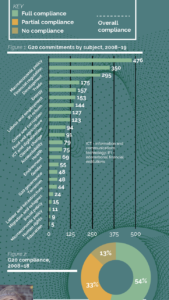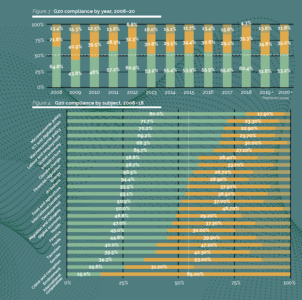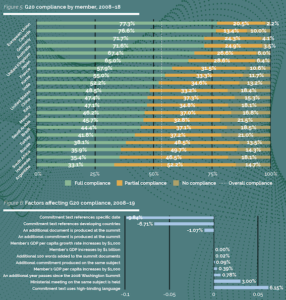Using data to improve compliance
Over the years, the G20 Research Group has generated a wealth of data, offering insight into the measures that can increase leaders’ compliance with their commitments
At a time when the economic fallout from COVID-19 has rendered coordinated global policy responses a necessity, the G20 Riyadh Summit is in an optimal position to be the platform where world leaders can come together to promote international financial stability and recovery. Success here will ultimately be determined by how much G20 members comply with the commitments they make at the summit.
By using data collected by the G20 Research Group, it is possible to identify which factors are associated with higher compliance, enabling strategies for increasing the impact of the 2020 Riyadh Summit and subsequent G20 summits.
Trends in compliance
The G20 Research Group has identified 2,667 commitments made at G20 summits between the first in Washington DC in 2008 and the 2019 Osaka Summit. Those commitments primarily target macroeconomic policy, financial regulation and development (see Figure 1). Researchers have also assessed a sample of those commitments for compliance, in the form of evidence of actions taken by G20 members between the summit at which the commitment was made until the next one. An analysis of this sample reveals trends in compliance by year, subject and member, and offers a detailed look at the impact of G20 summits.
The G20 Research Group estimates that 54% of these commitments made since the 2008 Washington Summit were complied with in full, 34% were partially complied with and 13% were not achieved at all (Figure 2).

The Washington Summit in November 2008 had the highest portion of full compliance (65%), and the London Summit in April 2009 had the lowest full compliance (44%). Preliminary results suggest that the Extraordinary G20 Leaders’ Summit in March 2020 had 53% full compliance two months later, similar to the full compliance of the G20 across all years (see Figure 3).
By subject, full compliance is strongest in the fields of microeconomic policy (80%), information and communications technology and digitalisation (72%) and macroeconomic policy (70%). Commitments regarding the environment (26%) and international cooperation (15%) have historically had the lowest compliance (see Figure 4).

By member, the European Union and Canada (both with full compliance of 77%) and Germany and Australia (both with 72%) have the highest full compliance with summit commitments. Indonesia (39%), Russia (38%), South Africa (36%) and Argentina (33%) have the lowest full compliance (see Figure 5).
Factors linked to high compliance
These data can also be used to identify specific factors associated with higher compliance (see Figure 6). By placing scores on a continuous scale, where full compliance is 100%, partial compliance is 50% and no compliance is 0%, the impact of these factors can be quantified.

This analysis reveals that references to a specific date have the greatest negative impact on compliance, associated with 10% less compliance than when commitments do not reference a specific date. References to developing countries also have much lower compliance (−7%).
However, significantly higher compliance was found when the commitment used highly binding language that strongly committed members to fulfil the commitment, as opposed to commitments with weaker pledges. For these stronger commitments, compliance was higher by 6%.
Also saliently, when a meeting of ministers responsible for the subject relevant to the commitment was held in the same year as the summit, compliance was 3% higher. This factor had the largest positive impact on compliance.
This information offers some insights into actions G20 members can take to improve their compliance with the commitments made at the summit. Although the results might not show a causal relationship, they provide sufficient evidence to support holding ministerial meetings on the same subjects and making strongly binding commitments at G20 summits. These two actions may increase compliance and therefore also increase the efficacy of the G20 itself.












